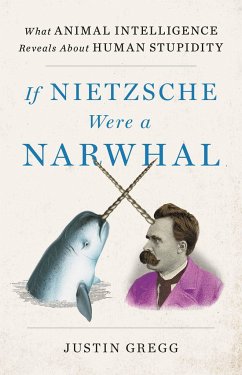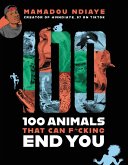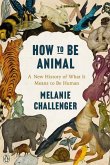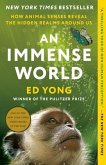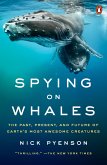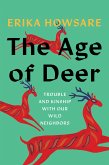16,99 €
inkl. MwSt.
Versandfertig in über 4 Wochen

8 °P sammeln
- Broschiertes Buch
- Merkliste
- Auf die Merkliste
- Bewerten Bewerten
- Teilen
- Produkt teilen
- Produkterinnerung
- Produkterinnerung
"Scientist Justin Gregg compares humans to animals and reveals the evolutionary reason why human intelligence is not more prevalent in the animal kingdom."--
Andere Kunden interessierten sich auch für
![100 Animals That Can F*cking End You 100 Animals That Can F*cking End You]() Mamadou Ndiaye100 Animals That Can F*cking End You18,99 €
Mamadou Ndiaye100 Animals That Can F*cking End You18,99 €![How to Be Animal How to Be Animal]() Melanie ChallengerHow to Be Animal15,99 €
Melanie ChallengerHow to Be Animal15,99 €![An Immense World An Immense World]() Ed YongAn Immense World16,99 €
Ed YongAn Immense World16,99 €![Spying on Whales Spying on Whales]() Nick PyensonSpying on Whales15,99 €
Nick PyensonSpying on Whales15,99 €![Das herzensgute Schwein Das herzensgute Schwein]() Sy MontgomeryDas herzensgute Schwein14,00 €
Sy MontgomeryDas herzensgute Schwein14,00 €![Einfach Mensch sein Einfach Mensch sein]() Sy MontgomeryEinfach Mensch sein14,00 €
Sy MontgomeryEinfach Mensch sein14,00 €![The Age of Deer The Age of Deer]() Erika HowsareThe Age of Deer15,99 €
Erika HowsareThe Age of Deer15,99 €-
-
-
"Scientist Justin Gregg compares humans to animals and reveals the evolutionary reason why human intelligence is not more prevalent in the animal kingdom."--
Hinweis: Dieser Artikel kann nur an eine deutsche Lieferadresse ausgeliefert werden.
Hinweis: Dieser Artikel kann nur an eine deutsche Lieferadresse ausgeliefert werden.
Produktdetails
- Produktdetails
- Verlag: Little Brown and Company
- Seitenzahl: 320
- Erscheinungstermin: 3. Oktober 2023
- Englisch
- Abmessung: 208mm x 137mm x 23mm
- Gewicht: 284g
- ISBN-13: 9780316388160
- ISBN-10: 0316388165
- Artikelnr.: 67479688
- Herstellerkennzeichnung
- Libri GmbH
- Europaallee 1
- 36244 Bad Hersfeld
- gpsr@libri.de
- Verlag: Little Brown and Company
- Seitenzahl: 320
- Erscheinungstermin: 3. Oktober 2023
- Englisch
- Abmessung: 208mm x 137mm x 23mm
- Gewicht: 284g
- ISBN-13: 9780316388160
- ISBN-10: 0316388165
- Artikelnr.: 67479688
- Herstellerkennzeichnung
- Libri GmbH
- Europaallee 1
- 36244 Bad Hersfeld
- gpsr@libri.de
Justin Gregg is a Senior Research Associate with the Dolphin Communication Project and an Adjunct Professor at St. Francis Xavier University where he lectures on animal behavior and cognition. Originally from Vermont, Justin studied the echolocation abilities of wild dolphins in Japan and The Bahamas. He currently lives in rural Nova Scotia where he writes about science and contemplates the inner lives of the crows that live near his home.
Introduction The human brand of intelligence is really not all that
exceptional (from an evolutionary standpoint), and is rarely the best
solution for how to live a good life. Animal thinking has a lot to teach
humans about how to live well without overthinking things. Chapter 1: The
Why Specialists The human capacity for causal inference is unsurpassed in
the animal kingdom. But animals seem to get by just fine (and sometimes
even better) without needing to know why things happen. Chapter 2: The Fake
News Species Humans are experts are manipulating the thoughts of other
humans through lies and deception. Animals, on the other hand, are usually
quite honest about their feelings and intentions. But being masters of
deception isn’t always as advantageous as it might seem. Chapter 3: To Be
or Not to Be an Ant Humans have come a long way since a handful of us left
the African continent to explore the Earth a few dozen millennia ago. We’re
fantastically populous, for a mammalian species. But we aren’t really
designed very well for group living. So many other species have hit on
solutions for living well in large numbers that could provide lessons for
us newfangled city-dwellers. Chapter 4: The Mystery of the Happy Chicken
Conscious awareness is not limited to the human species; there’s every
reason to believe that a myriad of animals—from the pets on our sofas right
down to the spiders in our basement—experience the world in ways not
dissimilar to a human. From a biological standpoint, however, consciousness
isn’t really that big of a deal. Chapter 5: Angry Gay Ducks Humans
certainly don’t have a monopoly on morality. Other species live by moral
codes, too. And when looking at how non-human species deal with problems of
right and wrong, or who gets to have sex with whom, or even the best way to
fight a war, most species have hit on solutions that call into question the
moral superiority of Homo sapiens. Chapter 6: Death Wisdom Knowledge of
our own mortality is arguably a rather crappy knock-on effect of the human
brand of intelligence. Other species might well know something of death but
are unlikely to dwell on it the way a human poet or philosopher could. Is
this kind of death wisdom a good or a bad thing? Chapter 7: Prognostic
Myopia Humans excel at predicting and planning for the distant future. No
other animal species understand the passage of time like we do. And yet,
our minds never evolved to truly feel the future repercussions of our
current decisions. Is this skill a benefit or a liability for our species?
Chapter 8: Human Exceptionalism Human and animal cognition are not really
all that different. In the few areas where humans do something truly
exceptional when it comes to intelligence, there is every reason to believe
that other species are nonetheless doing a better job than us at living a
good life with less complex thinking strategies. Humans could learn a lot
from the cognitive solutions offered by those species that are less
exceptional than we consider ourselves to be. Epilogue Does the science of
animal minds and animal intelligence leave us with a clear understanding of
how animals should be treated? Re-thinking the nature of human intelligence
and exceptionalism just might provide us with a few signposts showing us
why we should also re-think our relationship to the living creatures with
whom we share this planet.
exceptional (from an evolutionary standpoint), and is rarely the best
solution for how to live a good life. Animal thinking has a lot to teach
humans about how to live well without overthinking things. Chapter 1: The
Why Specialists The human capacity for causal inference is unsurpassed in
the animal kingdom. But animals seem to get by just fine (and sometimes
even better) without needing to know why things happen. Chapter 2: The Fake
News Species Humans are experts are manipulating the thoughts of other
humans through lies and deception. Animals, on the other hand, are usually
quite honest about their feelings and intentions. But being masters of
deception isn’t always as advantageous as it might seem. Chapter 3: To Be
or Not to Be an Ant Humans have come a long way since a handful of us left
the African continent to explore the Earth a few dozen millennia ago. We’re
fantastically populous, for a mammalian species. But we aren’t really
designed very well for group living. So many other species have hit on
solutions for living well in large numbers that could provide lessons for
us newfangled city-dwellers. Chapter 4: The Mystery of the Happy Chicken
Conscious awareness is not limited to the human species; there’s every
reason to believe that a myriad of animals—from the pets on our sofas right
down to the spiders in our basement—experience the world in ways not
dissimilar to a human. From a biological standpoint, however, consciousness
isn’t really that big of a deal. Chapter 5: Angry Gay Ducks Humans
certainly don’t have a monopoly on morality. Other species live by moral
codes, too. And when looking at how non-human species deal with problems of
right and wrong, or who gets to have sex with whom, or even the best way to
fight a war, most species have hit on solutions that call into question the
moral superiority of Homo sapiens. Chapter 6: Death Wisdom Knowledge of
our own mortality is arguably a rather crappy knock-on effect of the human
brand of intelligence. Other species might well know something of death but
are unlikely to dwell on it the way a human poet or philosopher could. Is
this kind of death wisdom a good or a bad thing? Chapter 7: Prognostic
Myopia Humans excel at predicting and planning for the distant future. No
other animal species understand the passage of time like we do. And yet,
our minds never evolved to truly feel the future repercussions of our
current decisions. Is this skill a benefit or a liability for our species?
Chapter 8: Human Exceptionalism Human and animal cognition are not really
all that different. In the few areas where humans do something truly
exceptional when it comes to intelligence, there is every reason to believe
that other species are nonetheless doing a better job than us at living a
good life with less complex thinking strategies. Humans could learn a lot
from the cognitive solutions offered by those species that are less
exceptional than we consider ourselves to be. Epilogue Does the science of
animal minds and animal intelligence leave us with a clear understanding of
how animals should be treated? Re-thinking the nature of human intelligence
and exceptionalism just might provide us with a few signposts showing us
why we should also re-think our relationship to the living creatures with
whom we share this planet.
Introduction The human brand of intelligence is really not all that
exceptional (from an evolutionary standpoint), and is rarely the best
solution for how to live a good life. Animal thinking has a lot to teach
humans about how to live well without overthinking things. Chapter 1: The
Why Specialists The human capacity for causal inference is unsurpassed in
the animal kingdom. But animals seem to get by just fine (and sometimes
even better) without needing to know why things happen. Chapter 2: The Fake
News Species Humans are experts are manipulating the thoughts of other
humans through lies and deception. Animals, on the other hand, are usually
quite honest about their feelings and intentions. But being masters of
deception isn’t always as advantageous as it might seem. Chapter 3: To Be
or Not to Be an Ant Humans have come a long way since a handful of us left
the African continent to explore the Earth a few dozen millennia ago. We’re
fantastically populous, for a mammalian species. But we aren’t really
designed very well for group living. So many other species have hit on
solutions for living well in large numbers that could provide lessons for
us newfangled city-dwellers. Chapter 4: The Mystery of the Happy Chicken
Conscious awareness is not limited to the human species; there’s every
reason to believe that a myriad of animals—from the pets on our sofas right
down to the spiders in our basement—experience the world in ways not
dissimilar to a human. From a biological standpoint, however, consciousness
isn’t really that big of a deal. Chapter 5: Angry Gay Ducks Humans
certainly don’t have a monopoly on morality. Other species live by moral
codes, too. And when looking at how non-human species deal with problems of
right and wrong, or who gets to have sex with whom, or even the best way to
fight a war, most species have hit on solutions that call into question the
moral superiority of Homo sapiens. Chapter 6: Death Wisdom Knowledge of
our own mortality is arguably a rather crappy knock-on effect of the human
brand of intelligence. Other species might well know something of death but
are unlikely to dwell on it the way a human poet or philosopher could. Is
this kind of death wisdom a good or a bad thing? Chapter 7: Prognostic
Myopia Humans excel at predicting and planning for the distant future. No
other animal species understand the passage of time like we do. And yet,
our minds never evolved to truly feel the future repercussions of our
current decisions. Is this skill a benefit or a liability for our species?
Chapter 8: Human Exceptionalism Human and animal cognition are not really
all that different. In the few areas where humans do something truly
exceptional when it comes to intelligence, there is every reason to believe
that other species are nonetheless doing a better job than us at living a
good life with less complex thinking strategies. Humans could learn a lot
from the cognitive solutions offered by those species that are less
exceptional than we consider ourselves to be. Epilogue Does the science of
animal minds and animal intelligence leave us with a clear understanding of
how animals should be treated? Re-thinking the nature of human intelligence
and exceptionalism just might provide us with a few signposts showing us
why we should also re-think our relationship to the living creatures with
whom we share this planet.
exceptional (from an evolutionary standpoint), and is rarely the best
solution for how to live a good life. Animal thinking has a lot to teach
humans about how to live well without overthinking things. Chapter 1: The
Why Specialists The human capacity for causal inference is unsurpassed in
the animal kingdom. But animals seem to get by just fine (and sometimes
even better) without needing to know why things happen. Chapter 2: The Fake
News Species Humans are experts are manipulating the thoughts of other
humans through lies and deception. Animals, on the other hand, are usually
quite honest about their feelings and intentions. But being masters of
deception isn’t always as advantageous as it might seem. Chapter 3: To Be
or Not to Be an Ant Humans have come a long way since a handful of us left
the African continent to explore the Earth a few dozen millennia ago. We’re
fantastically populous, for a mammalian species. But we aren’t really
designed very well for group living. So many other species have hit on
solutions for living well in large numbers that could provide lessons for
us newfangled city-dwellers. Chapter 4: The Mystery of the Happy Chicken
Conscious awareness is not limited to the human species; there’s every
reason to believe that a myriad of animals—from the pets on our sofas right
down to the spiders in our basement—experience the world in ways not
dissimilar to a human. From a biological standpoint, however, consciousness
isn’t really that big of a deal. Chapter 5: Angry Gay Ducks Humans
certainly don’t have a monopoly on morality. Other species live by moral
codes, too. And when looking at how non-human species deal with problems of
right and wrong, or who gets to have sex with whom, or even the best way to
fight a war, most species have hit on solutions that call into question the
moral superiority of Homo sapiens. Chapter 6: Death Wisdom Knowledge of
our own mortality is arguably a rather crappy knock-on effect of the human
brand of intelligence. Other species might well know something of death but
are unlikely to dwell on it the way a human poet or philosopher could. Is
this kind of death wisdom a good or a bad thing? Chapter 7: Prognostic
Myopia Humans excel at predicting and planning for the distant future. No
other animal species understand the passage of time like we do. And yet,
our minds never evolved to truly feel the future repercussions of our
current decisions. Is this skill a benefit or a liability for our species?
Chapter 8: Human Exceptionalism Human and animal cognition are not really
all that different. In the few areas where humans do something truly
exceptional when it comes to intelligence, there is every reason to believe
that other species are nonetheless doing a better job than us at living a
good life with less complex thinking strategies. Humans could learn a lot
from the cognitive solutions offered by those species that are less
exceptional than we consider ourselves to be. Epilogue Does the science of
animal minds and animal intelligence leave us with a clear understanding of
how animals should be treated? Re-thinking the nature of human intelligence
and exceptionalism just might provide us with a few signposts showing us
why we should also re-think our relationship to the living creatures with
whom we share this planet.
